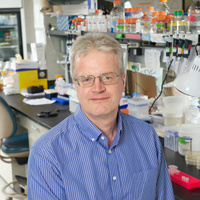
Long Branch, N.J. (my informative years 6-12th grade).
How/when did you become interested in science and/or medicine?
I realized science and research was my calling during my junior in high school when I attended Luther College for two months of summer research and courses; this exposure to Iowa brought me back to Iowa State University for my undergraduate degree.
When did you join the University of Iowa faculty?
August 1997
How or why did you choose to join the faculty at the University of Iowa?
UI had a stellar cystic fibrosis research program and a growing gene therapy program. I saw great opportunities here. The love of my life (Susie) was also from Keokuk and it was a great plus that my young children could see their grandparents more often.
Is there a teacher or mentor who helped shape your career?
I have been blessed to have many outstanding mentors that have molded me as a person and scientist, too many to name them all and each equally important to my career.
How do you see your faculty role impacting medicine and/or science?
From a scientific perspective, I was put on this earth to help cure cystic fibrosis. While I have been distracted with other scientific curiosities along the way, as I approach the later stages of my career this primary goal has become more pressing and absolute to my being.
What is the biggest change you've experienced in your field since you were a student?
The pace of scientific advancement and knowledge increases exponentially with time; this impacts the landscape for both training successful scientists and performing high impact research. The ability to rapidly self-educate, productively collaborate, and interpret big omics data are areas of knowledge critical for success in today biomedical sciences.
What one piece of advice would you give to today's students?
The scientific truth is a constant, so follow the data and not your favorite hypothesis—this will lead you to the answers you seek.
In what ways are you engaged in professional activities outside the University
(i.e. population based research, mentoring high school students, sharing your leadership/ expertise with organizations or causes, speaking engagement off campus, etc.)?
My interactions with the Cystic Fibrosis Foundation and the American Society for Gene and Cell Therapy have been very rewarding. I also enjoy meeting other faculty and academic leaders across the globe to discuss challenges and advances in medical research, but I try to limit my travel to 30 days a year.
What are some of your outside (personal) interests?
Playing cards with my wife Susie almost every night, my children, and bonsai. When I was a graduate student at Johns Hopkins, a visiting professor gave me his bonsai pots and tools after having killed his entire bonsai collection during an extended vacation. For 26 years, bonsai has been a passion of mine, but recently many have died—it may be time to pass my pots onto one of my student!